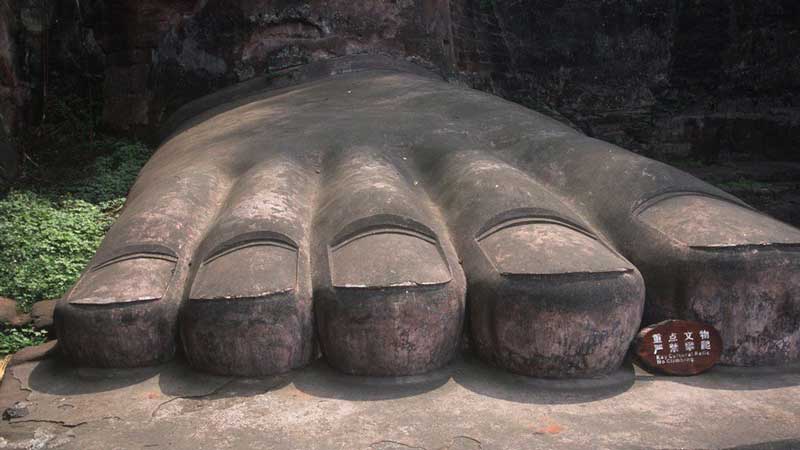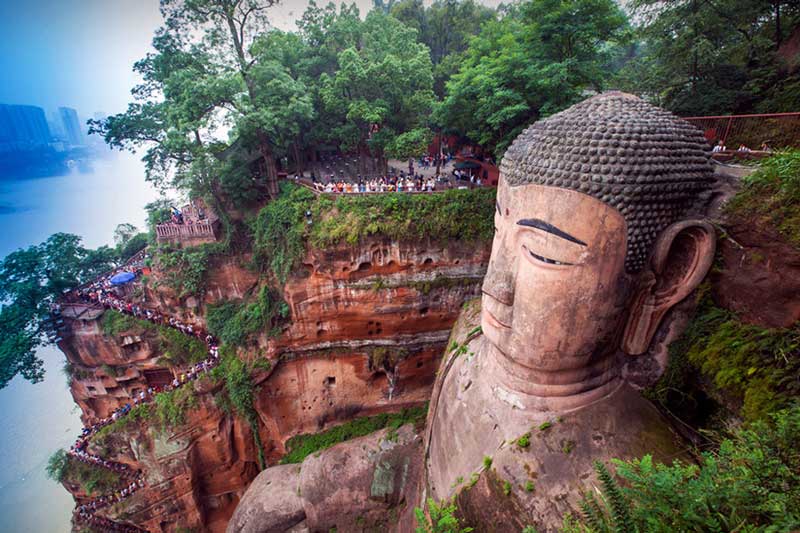
Created between 713 and 810 AD, during the Tang dynasty and carved out of the side of a mountain at the confluence of the Min River and River Dadu to the east of Leshan in Sichuan Province of China, the 233 feet (71 m) tall statue, depicting a seated Maitreya Buddha with his hands resting on his knees, and the rivers flowing below its feet, is regarded as the largest and tallest stone statue of Buddha in the world. Taller than the Bamyan Buddhas in Afghanistan, and much taller than the famous tall Buddha of Yungang Grottoes, the Leshan Giant Buddha, also named the Lingyun Buddha, has been enlisted in the UNESCO World Heritage Site, together with the Mount Emei Scenic Area, since 1996.
Construction of the giant statue of Buddha was initiated in 723 AD by a Buddhist monk named Hai Tong, who was very much concerned about the safety of the people living around the turbulent waters of the three rivers, Min, Qingyi, and Dadu, which make them suffer every year by their floods, even plague the vessels travelling down them. After thinking a lot over the matter, Hi Tong decided to carve a huge statue of Buddha facing the river as he believed that it would appease the river gods to calm the turbulent waters and keep the locals safe. But as he needed enough money to complete the mission, he visited many places throughout the country, begged for more than twenty years, and came back to Leshan after accumulating enough funds to start the construction. However, as he came back, the greedy authority of Leshan tried to force him to part with the fund. Since the king’s men kept on threatening him time and again despite his repeated refusal to oblige, he gouged out his eyes to express his piety and sincerity, which scared the soldiers away.

Unfortunately, Hi Tong passed away when the statue was completed only from the head to shoulder, and the project was stuck due to insufficient funding. Several years later, the disciples of Hi Tong resumed working on the statue with the personal financial support from Zhang Chou Jian Qiong, the highest governmental authority of the Sichuan area. However, the project had to be suspended again when the construction reached the knees of Lord Buddha, as Zhang Chou Jian Qiong was called back to work at the capital Xian. Nevertheless, after long 90 years from its initiation, the giant statue of Buddha, the final outcome of the hard work and sincerity of three generations of craftsmen, was finally completed in 803 AD, when Wei Gao, the military governor donated his salary to continue the project.
It is believed by the Buddhists around the world that Maitreya is a Bodhisattva who is supposed to appear on Earth in the future, achieve complete enlightenment, and teach the pure Dharma. The huge statue of Leshan Buddha, believed to be Maitreya Buddha, is still sitting today unperturbed, on the cliff of Xijiano Hill, with his hands on his knees, with the rivers flowing below his feet. While his head is around 48 feet (14.7 m) in height and about 32 feet (10 m) in width, his ears are 23 feet (7 m) long. However, although the entire sculpture was carved out of the side of a mountain, the ears of the gigantic statue were designed in wood, covered with mud on the surface to make clay, and then attached to the head, and that was not an easy task for the craftsmen of thousands of years ago to fix those ears to the stone head. His hair, skillfully arranged in spiral curls with 1021 twists, wonderfully embedded in the head, as if an integral part of the whole. His nose is approximately 18 feet (5.6 m) long, while his eyes and the width of his mouth are about 11 feet (3.3 m). The neck of the Leshan Buddha is 10 feet (3 m), the shoulder is 78 feet (8.3 m), while his instep is about 28 feet (8.3 m) in width which can accommodate around a hundred people, and a person can easily seat on his smallest toenail.

Apart from the enormous size of the sculpture, the most important architectural feature of the Leshan Buddha is its meticulous drainage system, which is made up of some hidden gutters and channels, scattered on the head and arms, behind the ears of the statue, even in its clothes. The system includes hidden drainage pipes in the body of the statue to carry away the rainwater and keep the inner part of the statue dry to help to reduce weathering and plays a vital part in the protection of the Buddha.
Hai Tong, the Buddhist monk, wished to create the massive statue of Buddha with the main intention to save the locals from flooding. As a result of the massive construction, a vast quantity of stone was removed from the cliff face, which deposited in the riverbed, and thus, the flow of the current of the river was altered, making life easier for the locals and the waterway safe for the passing ships.

During the creation of the gigantic statue of Buddha, a huge thirteen storey wooden structure was built to protect it from rain and sun, which was destroyed much later by the Mongols. Since then, it was exposed to the elements. Over time, the statue has been affected by the pollution emanating from the unbridled development in the region. To protect the huge statue from erosion, the first phase of its restoration project by the World Bank was officially initiated on 24 March 1962 for renovating the Buddha from the head to its chest and then strengthening the rock wall. The second phase began on 23 June 2002, when the rocks at the Buddha’s feet were repaired and the eroded part of the rock below the water level was meticulously repaired.

Today, the Leshan Giant Buddha attracts thousands of people around the world as one of the six world cultural heritage sites in the Province of Sichuan. There is a narrow and steep plank pathway for the pedestrians, which the enthusiastic visitors may use to get a close-up view of the gigantic structure for appreciating the changing view of the Buddha’s enormous body through multiple perspectives. Apart from that, sightseeing boats are also available to get a more vivid panoramic view.